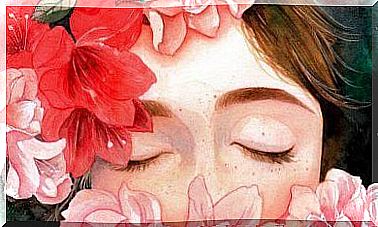The Psychology Of Resentment: What Lies Behind Resentful People?

Resentful people keep a piece of hot coal in their hands. They expect to be able to cast it when they least expect it on the people who offended them. However, the ones who end up getting burned are not these other people. But well themselves, by dint of playing with this fire for so long. This source of rage. Of hatred and ill-being.
Even if reading these few lines surely comes to mind a resentful person whom you know or have known in the past, there is one aspect that should not be overlooked. This dimension and this deep feeling (undoubtedly self-destructive), it is not only people who do not know how to practice the healthy exercise of forgiveness who experience them. In reality, this topic has its depth, nuances, and opposing dimensions that we can all drift into at some point in our lives.
Thus, it must be said that beyond appearances, we are faced with a very recurring type of feeling. People who experience it are, for example, those who have been hurt, abandoned or betrayed by their family circle. Those who suffer from it are those who have been deceived in their emotional relationship. Resentment is also this permanent feeling that resides in those who have survived a war. Or armed conflict. As we can see, these are understandable situations. Although psychologically unhealthy.
Unhealthy, because resentment is characterized by a highly harmful fact: chronicity. It is these distressing states that last over time, and that we drag behind us so well that they interfere in other areas of our life. Our mood changes, we can no longer trust others, our attitudes vary and even our way of treating those around us is altered. Resentment is like oxide, it spreads and ends up weakening any structure, any identity.

Resentful people: characteristics and psychological profile
Resentful people have a safe deposit box deep inside them. They hide there the weight of an insult. The pain of deception. Of a betrayal. Even an abandonment or an offense. This safe is armored for an obvious reason. Indeed, they do not want to forget a single nuance of what happened. So all this moral damage compressed into a safe place comes with that sadness that at one point turned into rage. And later in hate.
Thus, in all this psychological fabric there is generally added one last component: the desire for revenge. In fact, what we want in the majority of cases is that in a certain way, what has hurt us, no one receives the change in return. The same suffering. And under the same conditions. Therefore, knowing all this, quite often resentful people exhibit the following characteristics.
Inability to forgive
Sometimes forgiving is very difficult, we know. However, we must be clear that forgiveness is above all that which allows us to turn a page. And to regain our emotional balance. Thus, and with regard to this type of profile characterized by deep resentment, it should be noted that in addition to not wanting to forgive, resentful people feed their own suffering by thinking daily about the weight of the offense. Or the damage suffered.
There is therefore constant feedback and with it an intensification of suffering. In fact, studies such as the one carried out at the University of Pisa and published in the journal Frontières in Human Neuroscience tell us that fueling resentment opens up the emotional wound even more. However, the act of forgiving regulates a large number of neural structures. It promotes calm. Reduces stress. And activates areas such as the prefrontal cortex (related to problem solving).

Dichotomous thinking
Either you are with me or you are against me. Either you help me or you betray me. This type of approach conforms to a clear cognitive distortion. It’s a very rigid thought pattern that resentful people aren’t even aware of. Indeed, they are used to always going along the extremes. To be in very polarized positions where the only thing they can do is establish enormous and bitter distances with the people around them.
A pride that never ceases
Pride is a hobbyhorse that pervades everything. Destroy everything and transform everything. These characteristics make this type of person always on the defensive. And that they still feel hurt and deeply offended. It is not easy to have a dialogue or to come to agreements with people who are always carried away by pride. By this attitude which consists in taking everything personally.
Inability to meet emotional and psychological needs
We can all be hurt. So we have every right to have negative feelings towards the person who has harmed us. However, there is one aspect that does not fit into psychological normality. It is the fact of permanently maintaining this rage. This painful memory and the imprint that accompanies it. The same that ends up turning into chronic bitterness.
We have a total obligation to take on what we have accepted and move forward. Moving forward is not forgetting, but learning to use certain psychological strategies to fight against injuries and allow us to seize new opportunities. So the people who don’t, those who are not able to find a way out, a valid way out of such rage and bitterness end up making grudge their way of life.
How can we put an end to the grudge that paralyzes and dominates us?
In an article published in the journal Behavioral Psychology, we talked about an interesting study carried out by researchers at the University of Ontario (Canada) on this subject. They explain to us the need to provide tools to resentful people so that they can give shape to emotional forgiveness.
This dimension, this healthy exercise is decisive for a very simple reason: it allows us to free ourselves from negative emotions in order to generate a new psychological reality from which to start working.
- On the other hand, it is better for people with this type of profile to work on the flexibility of their thinking approach. This will make it easier for them to see things from new perspectives.
- They should also be offered tools for managing rabies. A dimension always inhabited by distorted thoughts. And by an unhealthy physiological activation.
- Resentful people, moreover, need to focus their attention on other aspects with which to be able to shift the gaze from the past to the present. Feeding exclusively on negative memories of yesterday hinders the opportunity to live freely. Therefore, it is recommended to initiate new projects, which open up to new experiences, new passions, new relationships, etc.
In conclusion, just as we often hear that grudge is a bottomless abyss or a steppe without borders, no one deserves to live in the same scenario forever. So let’s learn to build loopholes. Paths to free us. And breathe with greater peace of mind. But also greater dignity.










